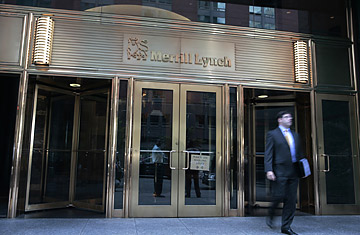
A man walks out of Merrill Lynch's headquarters in New York.
Stocks are down, Treasuries are up, and the economy is in a funk. To get a fix on what's ahead, TIME talked to two top strategists at Merrill Lynch: Richard Bernstein, who plots U.S. investment strategy, and Michael Hartnett on international. Both spoke with TIME contributing editor John Curran.
TIME: We're coming out of a pretty tumultuous year. What landscape awaits investors in 2009?
Richard Bernstein: We've really stuck our necks out on this one and said that 2009 is going to be better than 2008.
Michael Hartnett: And by the way, 2009 is the year of the bull, the Chinese year of the bull. Thank God 2008 wasn't the year of the bull. People would never believe in China again.
Bernstein: Seriously, we think there's a metamorphosis under way and the credit mania stories that we saw in the last three, four, five, six years are unlikely to come back. We think overall we're going to be moving away from these credit-driven stories and much more towards self-financing stories.
TIME: Flesh that out a little.
Bernstein: Well, that could be anything from very high quality bonds as opposed to, kind of, the junk that has been sold over the last several years and performed well. It could be the stocks of high quality companies as opposed to the riskier stuff. Our focus is on sustainable and demonstrable growth.
TIME: And as we go into 2009, are we going to be having more of the same economic trouble?
Bernstein: Our U.S. economist, Dave Rosenberg, is not the most bullish economist you'll meet — he's still thinking the GDP's going to continue to decelerate pretty much through 2009 followed, maybe, by slightly better growth in 2010. When the recovery does come it will be somewhat anemic relative to past recoveries. So, he's still looking for what people call a saucer-shaped recovery as opposed to the V-shaped recovery that a lot of people like to talk about.
TIME: What investing theme works best in that scenario?
Bernstein: We have several themes. The infrastructure theme is one of them but we put a little twist on that because we don't think people have really thought about it all the way through. A lot of infrastructure-related companies are going to see pretty substantial declines in their revenues and earnings because they've been so exposed to the energy sector, and energy-related capital spending is being cut back pretty dramatically here. So our analysts are focusing on those companies that are more related to water projects and highway projects and have minimal exposure to the energy and commodities side of the economy.
TIME: What about the fallen stars, the real estate sector or the oil sector? Are these going to see rebounds in 2009?
Bernstein: What you just mentioned are two sectors — especially real estate — that are very, very credit-driven. And one of the reasons we don't think you'll see a V-shaped recovery in the United States is that the early portions of the economic recovery cycle are always very, very dependent on credit. Things like housing, autos, big-ticket retailing. And we doubt that credit creation is going to see the kind of dramatic recovery that would cause a significant upturn in the economy.
Take real estate. Nobody buys a home for cash, or at least very few people do. Certainly on the commercial side people don't buy buildings for cash, they all finance it. Those financing rates are really still quite prohibitive right now.
TIME: For people willing to invest, is it better to be in growth funds or value funds?
Bernstein: We do not think that people should be looking at value funds yet. Value stocks are very dependent on credit, that is, their performance is very related to the upturn in the economic cycle. We really don't have a lot of evidence right now to support an emphasis on value stocks. We prefer growth stocks, though there's more than one type of growth stock. There are the companies offering stable growth, where the stocks sell at a reasonable price, and then there's kind of the momentum growth. And growth mutual funds follow one or the other — they rarely follow both. We prefer growth at a reasonable price, not the momentum fund.
